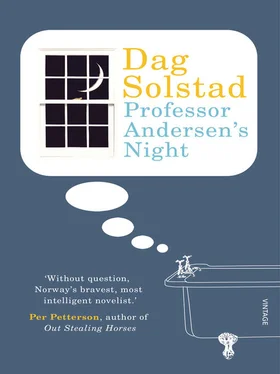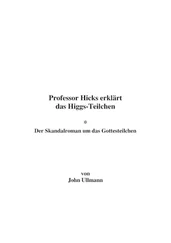Dag Solstad - Professor Andersen's Night
Здесь есть возможность читать онлайн «Dag Solstad - Professor Andersen's Night» весь текст электронной книги совершенно бесплатно (целиком полную версию без сокращений). В некоторых случаях можно слушать аудио, скачать через торрент в формате fb2 и присутствует краткое содержание. Год выпуска: 2011, Издательство: Harvill Secker, Жанр: Современная проза, на английском языке. Описание произведения, (предисловие) а так же отзывы посетителей доступны на портале библиотеки ЛибКат.
- Название:Professor Andersen's Night
- Автор:
- Издательство:Harvill Secker
- Жанр:
- Год:2011
- ISBN:нет данных
- Рейтинг книги:3 / 5. Голосов: 1
-
Избранное:Добавить в избранное
- Отзывы:
-
Ваша оценка:
- 60
- 1
- 2
- 3
- 4
- 5
Professor Andersen's Night: краткое содержание, описание и аннотация
Предлагаем к чтению аннотацию, описание, краткое содержание или предисловие (зависит от того, что написал сам автор книги «Professor Andersen's Night»). Если вы не нашли необходимую информацию о книге — напишите в комментариях, мы постараемся отыскать её.
Professor Andersen fails to report the crime. The days pass, and he becomes paralysed by indecision. Desperate for respite, the professor sets off to a local sushi bar, only to find himself face to face with the murderer.
Professor Andersen's Night
Professor Andersen's Night — читать онлайн бесплатно полную книгу (весь текст) целиком
Ниже представлен текст книги, разбитый по страницам. Система сохранения места последней прочитанной страницы, позволяет с удобством читать онлайн бесплатно книгу «Professor Andersen's Night», без необходимости каждый раз заново искать на чём Вы остановились. Поставьте закладку, и сможете в любой момент перейти на страницу, на которой закончили чтение.
Интервал:
Закладка:
The next morning Professor Andersen and his colleague from Trondheim went skiing. His colleague drove out to a place called Bymarka, which was a popular skiing area. They took the skis and poles down from the roof rack and, standing next to the car, started to rub on wax. It was really miserable, chilly weather. Overcast, rather cold, and with snow and drizzle in the air. His colleague took the business of selecting ski wax very seriously. He had a thermometer with him, which he stuck in the snow to measure the temperature, then suggested to Professor Andersen that they should choose green wax as an under-coat, and blue wax on top of that, which Professor Andersen agreed with. He informed his colleague at the same time that, though it was true that he, like all Norwegians, was born with skis on his feet, nevertheless it was a long time ago, so he suggested they should go on a nice easy ski trip, something his colleague didn’t object to. With nice, easy strokes they set off through Bymarka in Trondheim. When they came to a downhill slope, his colleague set out boldly and confidently, while Professor Andersen stood a moment at the top and surveyed the situation, before he, too, set off. On the uphill slopes his colleague demonstrated his agility, and rushed upwards on light skis, while Professor Andersen again took it nice and easy and moved at his own pace. But over the flattish stretches they went side by side. After a while they arrived at a skiers’ cabin, where they went in and each had a hot blackcurrant drink. Professor Andersen took the opportunity, as he had done yesterday, to talk about something that was weighing on his mind. He was anxious about the future. His own future, as a professor of literature. Literature is not going to survive, not in the way we think of it. Its survival is just a matter of form, and that is no longer enough. All enthusiasm lies in the present, and in our day and age nothing can outdo the ability of commercialism to arouse enthusiasm and stir the hearts of the masses, and that is the spirit of the present time. He was afraid they had suffered a definitive defeat. They had to look this fact in the eye, if for no other reason than for their own peace of mind. He, for his part, couldn’t share the enthusiasm felt by the masses for the token forms of culture they were being offered; he didn’t understand how one could possibly feel enthusiastic about such things, but in practice it was quite evident that he erred, at any rate with regard to that. He didn’t want to comment on the quality of such culture, at least not to his colleague, who could see this too. He no longer wanted to conceal the fact that he thought the time he lived in was pathetic. He didn’t enjoy living in it at all, but at the same time he couldn’t present an alternative to it. ‘Because we aren’t timeless intellectuals, we are intellectuals in a commercial age, and deeply influenced by what stirs the hearts of the masses. What stirs the hearts of the masses are the consequences of our own inadequacy. Purely and simply. When were you last strongly stirred by watching or reading a Greek tragedy? I mean really stirred, shaken to the depths of your being. Not just nodding in recognition, quietly enjoying it, which we ought not to underestimate, that has to be said, quiet enjoyment has its significance, for the two of us. But stirred. As you can be when reading a novel from our own day and age? I think I’m on to something here. Our relationship to the past is marked by deep indifference, even if we do say something to the contrary, and even if we mean what we say when we say that it’s a matter of the greatest significance. Because it is a matter of the greatest significance, yet nevertheless we feel so bound to it by a sense of duty. It looks like our consciousness is insufficiently equipped to fulfil the body’s need for spiritual immortality. I can say that, being a professor of literature, and say it to you, my colleague. My nerves shriek in dread at the thought of no longer possessing a historical consciousness, because it means that our day and age will disappear along with us, so when we stage Ibsen at the National Theatre, my nerves relax, because if we can stage a play from the last century in one of the country’s finest buildings, with extensive publicity and often to a full house, then the coming generations may regard us in the same light. But it isn’t Ibsen’s work we perform, it’s Ibsen’s reputation. To the work as such, we are more or less indifferent, yes we are, now barely a hundred years after it was written. It’s the stage director’s work we see performed, Stein Winge’s or Kjetil Bang Hansen’s. It’s Winge’s work and Ibsen’s reputation. My stomach churns in protest at the thought of there being no reputation so great that it can’t survive a hundred years. We want to have immortal works, but do such things exist, for us? Ibsen’s best plays are just barely a hundred years old, we call them immortal already, but are they? Even now we can see how difficult it is to make them seem relevant to us. On stage they have to be modernised and made contemporary, so that we will experience something so-called great while watching them, and even then it doesn’t succeed, as a rule. And as drama to be read? Occasionally I think, after having read through and studied, for instance, Ghosts : well, was that all? Was there nothing else? Was this the most outstanding accomplishment of the 1880s, was this the most outstanding intellectual accomplishment in Europe in the nineteenth century? Certainly it’s good, but is it really the most outstanding achievement that can be accomplished? It will probably turn out that it is, but my question still remains: was that all? Is there nothing else? I have actually studied Ghosts for years, and know that it’s perfect. Yes I am and will continue to be impressed by what it is, perfect, but nonetheless I ask: was that all? Was that it? I am not stirred by it. I’m not shaken. Not like the audience when it was performed for the first time, as a contemporary event. In my case it has not survived as the actual revelation it once was, and so how can I carry out my duty to society, which is to pass this play down to new generations? I’m in doubt, I’m so terribly in doubt about my own function in this age, which I really cannot stand any longer. The ravages of time, that is what gnaws at me, destroying everything. The ravages of time gnaw at even the most outstanding intellectual accomplishments and destroy them, making them pale and faded.’ ‘But you must be able to accept the patina of time,’ his colleague said suddenly.
His colleague had been sitting, listening calmly to Professor Andersen’s outpourings, because he probably understood that they came from the heart, and therefore didn’t interrupt him. But now he could no longer hold his tongue, and a discussion arose between the two gentlemen about the patina of time. A discussion about the upheavals versus the quiet enjoyment afforded by art, and about whether it wasn’t their task as professors of literature to pass on this quiet enjoyment, and not the stirring aspects, to their students. His colleague strongly maintained that it was their task to convey a sense of quiet enjoyment, and not stirring emotions, which in any case, as Professor Andersen so rightly pointed out, had been lost long ago in the historic moments from which the work of art had once sprung. The essential thing to recognise, and enjoy, was the noble patina which rested on a work of art which had lasted beyond its own century. ‘That is also historical awareness. Nothing else is in our power, and that is enough,’ maintained his colleague. ‘That is answer enough with regard to our deep desire to have something that outlasts us.’ He wasn’t stirred by reading Dante’s The Divine Comedy , not even by its depictions of Hell, and it wasn’t something he missed. But he could quietly and genuinely enjoy reading this work written in Florence in the thirteenth century, both because it actually was accessible to him, a Norwegian at the end of the twentieth century, and because the conditions both he and Professor Andersen endured in life, when all was said and done, were such that it was possible for him, after painstaking study, to relate to the work itself, yes, even to understand it. That the freshness was gone wasn’t something he missed, the noble weight bestowed by the patina fully compensated for that. Professor Andersen maintained in reply that his colleague probably didn’t fully understand what he was attempting to say, nor to what extent it troubled him. He certainly didn’t underrate the noble patina, he merely wanted to point out the consequences of the fact that there is no great stir in the modern sense when studying and gaining insight into a canonical work, consequences which Professor Andersen suspected might be approaching the dreadful consequences that spring out of breaking a taboo, or tampering with one. The silent despair of someone who does something like that. Indeed, he had to be allowed to express himself in this way, even if it didn’t sound sufficiently stringent to his colleague, because the thoughts he had were rather vague, but were no less troublesome on that account. He was obliged to question whether the quiet enjoyment his colleague talked about was an expression of perplexity with regard to history, and our true relationship to it. That there is an element of resignation involved, that he fully understood and respected, indeed, he dared also say, shared; even so it alleviated an unease he was no longer capable of alleviating. The suspicion that human consciousness was not sufficient to create works of art fit to survive their own period. The futile battle of consciousness against time. ‘The patina is necessary to cover up this horrifying state of affairs, that is what I am afraid of,’ said Professor Andersen. ‘We have such a burning desire for something we are incapable of achieving, and we can’t bear to face up to this lack of ability. We can’t, because that will drown our consciousness, and with it human dignity. One may find the meaninglessness great enough as it is, even in a world which believes in immortality through great intellectual accomplishments which survive the ravages of time. Which the ravages of time do not affect. Oh, what a marvellous thought, what a pleasing concept that expresses. Indeed, perhaps we can compare this to our own individual lives and the bright expectations we have about our experiences. All of us would like to become wiser individuals as the years pass, but is it true that we do? In my case it definitely isn’t. I’m not a wiser person now than when I was twenty-five years old, I’m just older. The experiences I’ve had aren’t worth much to anyone but myself. My experiences are of no value so they can be passed on to others, and younger individuals; they are a burden I have to bear alone. I have to relate to my experiences, mainly as impediments that make me mindful of my age, so I don’t continue to act “youthful”, “young in spirit”, something which is distasteful, if I may say so.’ ‘Now I’m beginning to understand a little of what you mean,’ his colleague interjected. ‘And everything is pretty black, really. You cast doubt on everything you can cast doubt on, and I must simply admit my situation in life is not such that there is any attraction in letting myself be tempted by your points of view. No, Pål, old chap, if we want to get down to the car before it gets dark, we’ll just have to get a move on.’
Читать дальшеИнтервал:
Закладка:
Похожие книги на «Professor Andersen's Night»
Представляем Вашему вниманию похожие книги на «Professor Andersen's Night» списком для выбора. Мы отобрали схожую по названию и смыслу литературу в надежде предоставить читателям больше вариантов отыскать новые, интересные, ещё непрочитанные произведения.
Обсуждение, отзывы о книге «Professor Andersen's Night» и просто собственные мнения читателей. Оставьте ваши комментарии, напишите, что Вы думаете о произведении, его смысле или главных героях. Укажите что конкретно понравилось, а что нет, и почему Вы так считаете.












